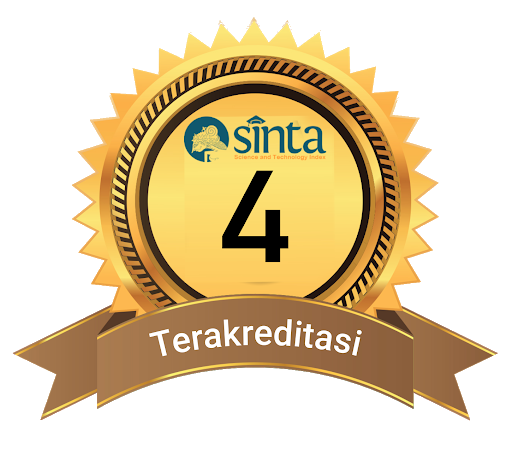Correlation Between Techniques and Methods in Memorizing the Quran
Abstract
Keywords
Full Text:
PDFReferences
Adiwijayanti, D. D., Purwati, H., & Sugiyanti, S. (2019). Pengaruh Hafalan Al-Qur’an Terhadap Prestasi Belajar Matematika Siswa MTs. Square : Journal of Mathematics and Mathematics Education, 1(2), 109. https://doi.org/10.21580/square.2019.1.2.4771
Afifah, N., & Suriansyah, A. (2019). Implementation of Islamic Aqeedah Based Curriculum at Khoiru Ummah Tahfizh Plus Kindergarten. Journal of K6, Education, and Management, 2(1), 47–57. https://doi.org/10.11594/jk6em.02.01.07
Aisyah, N., & Sofiah, L. F. (2021). The Role of Pesantren in Improving the Religiosity of Tahfidz Al-Quran Santri in Yogyakarta. 518(ICoSIHESS 2020), 69–74. https://doi.org/10.2991/assehr.k.210120.107
Akhmar, I. A., Lestari, H., & Ismail, Z. (2021). Metode Efektif Menghafal Al-Qur’an Bagi Siswa Madrasah Ibtidaiyah: El-Mujtama: Jurnal Pengabdian Masyarakat, 1(1), 1–20. https://doi.org/10.47467/elmujtama.v1i1.261
Akmal, R. (2021). Learning Tahfidz Quran Method in North Lintau Buo Subdistrict Flat Land District. Ruhama : Islamic Education Journal, 4(1), 47–56. https://doi.org/10.31869/ruhama.v4i1.2617
Albi, N. S., Hadiyanto, A., Hakam, A., & Wajdi, F. (2020). Metode Menghafal Alquran Tawazun dan Peningkatan Self Esteem Santri di Pesantren Daarul Huffadz Indonesia. Jurnal Online Studi Al-Qur’an, 16(2), 213–232. https://doi.org/10.21009/jsq.016.2.06
Anita, R. A., Akhlak, F. K., & Veronika, A. F. (2021). Pengaruh Program Tahfizh Terhadap Motivasi Belajar Pendidikan Agama Islam Di Madrasah Ibtidaiyah (Mi) Mumtaza Islamic School. EL-Muhbib: Jurnal Pemikiran Dan Penelitian Pendidikan Dasar, 5(1), 26–44. https://doi.org/10.52266/el-muhbib.v5i1.636
Anwar, K. (2018). IMPLEMENTASI METODE ODOA (ONE DAY ONE AYAT) DALAM MENINGKATKAN KEMAMPUAN MENGHAFAL AL-QURAN. In JPII (Vol. 2, Issue 2). https://doi.org/https://doi.org/10.35316/jpii.v2i2.71
Anwar, S., Ali, S., Labib, A., & Rahmawati, yasinta. (2021). Penerapan Metode Muri-Q Pada Hafalan Al-Qur’an di Rumah Tahfizh Al-Furqon Pringsewu. Ensiklopedia: Jurnal Pendidikan Dan Inovasi Pembelajaran Saburai, 1(1), 8–14. https://doi.org/10.24967/esp.v1i01.1351
Ardi, A. (2021). Perancangan Aplikasi Android untuk Kegiatan Tahfizh Alquran Daring menggunakan Platform Firebase. JATISI (Jurnal Teknik Informatika Dan Sistem Informasi), 8(1), 14–25. https://doi.org/10.35957/jatisi.v8i1.702
Arifin, H. (2022). SECRETS OF QUR’AN INTERACTION AND BRAIN HEALTH Hasanul Arifin Faculty of Medicine, University of Muhammadiyah North Sumatra, Indonesia. 3(1), 13–21. https://doi.org/https://doi.org/10.55116/IJICM.V3I1.33
Azizah, A. N. I., Marhumah, M., & Sufa, F. F. (2021). Talaqqi Method: Children’s Language Development in Tahfidzul Al-Qur’an Program During Covid-19 Pandemic. JOYCED: Journal of Early Childhood Education, 1(2), 74–87. https://doi.org/10.14421/joyced.2021.12-03
Basir, A., Suri, S., Nirwana AN, A., Sholihin, R., & Hayati, H. (2022). relevance of national education goals to the guidance of the Al-Quran and Al-Hadith. Linguistics and Culture Review, 6, 122–137. https://doi.org/10.21744/lingcure.v6ns5.2088
Bisri, H., & Abdillah, M. B. (2018). Pengelolaan Model Pembinaan Tahfiz Alquran. Tadbir Muwahhid, 2(1), 60. https://doi.org/10.30997/jtm.v2i1.1157
Burhanuddin, H., Effendi, M. Y., Hambali, M. R., Fahman, M., & Hidaya, R. E. (2021). Bulletin of Community Engagement. Pemberdayaan Potensi Lokal Dan Peningkatan Ekonomi Masyarakat Desa Semawot Sukosewu Bojonegoro, 1(1), 1–6. https://doi.org/http://dx.doi.org/10.51278/bce.v1i1.85
Doyok, R. (2021). Model Evaluasi CIPP dalam Mengevaluasi Program Tahfiz Selama Daring di SMP Islam Al-Ishlah Bukittinggi. Ideas: Jurnal Pendidikan, Sosial, Dan Budaya, 7(3), 73. https://doi.org/10.32884/ideas.v7i3.429
Fairuzillah, M. N., & Listiana, A. (2021). The Positive Impact of Memorizing the Qur’an on Cognitive Intelligence of Children. Proceedings of the 5th International Conference on Early Childhood Education (ICECE 2020), 538(Icece 2020), 334–338. https://doi.org/10.2991/assehr.k.210322.071
Hasanah, M. (2021). The Role of Parents in Children Memorizing the Qur’an in Middle School Based on the Amanatul Ummah Islamic Boarding School. Tafkir: Interdisciplinary Journal of Islamic Education, 2(2), 139–156. https://doi.org/10.31538/tijie.v2i2.43
Hastini, H., & Maslamah, M. (2021). Implementation of tahfizhul Qur’an learning at PPTQ Griya Qur’an 3 Putri Klaten. Journal of Educational Management and Instruction (JEMIN), 1(2), 111–118. https://doi.org/10.22515/jemin.v1i2.3437
Hidayah, N., Afwani, R., & Jatmika, A. H. (2019). Rancang Bangun Aplikasi Bantu Hafal Al-Qur’an Metode At-Taisir Berbasis Android. Journal of Computer Science and Informatics Engineering (J-Cosine), 3(1), 30–38. https://doi.org/10.29303/jcosine.v3i1.233
Ishak, I., Rahman, S. A., Ibrahim, F. W., Khair, N. M., Warif, N. M. A., Harun, D., Ghazali, A. R., Ariffin, F., Din, N. C., Mohamad, S., Mastor, K. A., Haneefa, M. H. M., & Ismail, S. (2021). The Impact of Quran Memorization on Psychological and Health Well-Being. Review of International Geographical Education Online, 11(8), 337–344. https://doi.org/10.48047/rigeo.11.08.33
Islam, I., Di, A. A. N., Dasar, S., Terpadu, I., & Deli, D. O. D. (2020). 2020 Agustus Jurnal Edukasi Pendidikan Islam LEARNING PROGRAMS IN INTEGRATED ISLAMIC BASIC SCHOOLS OF DOD Evaluation Of The Process … Evaluation Of The Process …. 1–18. https://doi.org/http://dx.doi.org/10.30868/ei.v9i02.904
Ismail, M. J., Razak, K. A., & Baharudin, H. (2021). Mentoring at Maahad Tahfiz Al-Quran Negeri (Mtqn) In Pahang, Malaysia. Turkish Journal of Computer and Mathematics Education (TURCOMAT), 12(10), 3383–3388. https://doi.org/https://doi.org/10.17762/turcomat.v12i10.5014
Jimba, A. I. (2021). An Assessment of Almajiri Integrated Model School Pupils’ Performance in Qur’anic Subjects in Sokoto State, Nigeria. International Journal of Islamic Educational Psychology, 2(1), 1–14. https://doi.org/10.18196/ijiep.v2i1.11400
Latipah, E. (2022). Motives, self-regulation, and spiritual experiences of hafizh (the qur’an memorizer) in indonesia. International Journal of Instruction, 15(1), 653–672. https://doi.org/10.29333/iji.2022.15137a
Mulyani, D., Pamungkas, I., & Inten, D. N. (2018). Al-Quran Literacy for Early Childhood with Storytelling Techniques. Jurnal Obsesi : Jurnal Pendidikan Anak Usia Dini, 2(2), 202. https://doi.org/10.31004/obsesi.v2i2.72
Mustakim, M., Rouzi, K. S., & Tumin, T. (2021). Spiritualization of Child Education in the Qur’anic Sufism Perspective in the Covid-19 Era. International Journal of Islamic Educational Psychology, 2(1), 53–66. https://doi.org/10.18196/ijiep.v2i1.11132
Nadaa, F. Q. (2021). Metode Mudarasah sebagai Upaya Peningkatan Menjaga Hafalan Al-Quran. Al-Liqo: Jurnal Pendidikan Islam, 6(1), 48–55. https://doi.org/10.46963/alliqo.v6i1.248
Orba Manullang, S. (2021). the Effectiveness of Al-Quran Memorization Methods for Millennials Santri During Covid-19 in Indonesia. Jurnal Pendidikan Islam, 4(2), 195–207. https://doi.org/https://doi.org/10.31538/nzh.v4i2.1334
Pasaribu, R. (2019). Pengaruh Hafalan Al-Qur’an Terhadap Kedisiplinan Belajar Dan Prestasi Belajar Pada Siswa Sd Muhammadiyah Suronatan Yogyakarta. G-Couns: Jurnal Bimbingan Dan Konseling, 2(2), 173–187. https://doi.org/10.31316/g.couns.v2i2.66
Pudjiati, R. R., Masyitoh, M., Ahmad, G., & Mutiara, D. (2022). Tahfizh Al-Qur’an Learning Management Model in Early Children in Family Education: A Study in Serang City, Indonesia. Saudi Journal of Humanities and Social Sciences, 7(1), 14–20. https://doi.org/10.36348/sjhss.2022.v07i01.003
Rahmi, Y. (2019). Metode Muraja’ah dalam Menghafal Al-Qur`An di Pondok Pesantren Al-Mubarok Tahtul Yaman Kota Jambi. INNOVATIO: Journal for Religious Innovation Studies, 19(1), 65–76. https://doi.org/10.30631/innovatio.v19i1.78
Rajagede, R. A., & Hastuti, R. P. (2021). Al-Quran recitation verification for memorization test using Siamese LSTM network. Communications in Science and Technology, 6(1), 35–40. https://doi.org/10.21924/CST.6.1.2021.344
Rajagede, R. A., Hisyam, Y. H., Yulianto, M. I. A., Ridwanto, F. A., Putranto, A. T., & Danar, M. R. F. P. (2021). Personalized Al-Quran Memorization Testing System Using Group Decision Support System. Aceh International Journal of Science and TechnologyRajagede, R. A., Hisyam, Y. H., Yulianto, M. I. A., Ridwanto, F. A., Putranto, A. T., & Danar, M. R. F. P. (2021). Personalized Al-Quran Memorization Testing System Using Group Decision Support System. A, 10(3), 171–181. https://doi.org/10.13170/aijst.10.3.23199
Rusadi, B. E. (2020). Tahfiz Online: Sarana Menghafal Alquran Secara Online. Intiqad: Jurnal Agama Dan Pendidikan Islam, 12(1), 18–33. https://doi.org/10.30596/intiqad.v12i1.4593
Sahlini, D., & Ismaniar, I. (2020). Pelaksanaan Program Tahfiz pada Anak Usia Dini di Markaz Tahfiz Balita Air Dingin Kota Padang. Ranah Research : Journal of Multidicsiplinary Research and Development, 3(1), 272–278. https://doi.org/https://doi.org/10.31933/rrj.v3i1.354
Salim, A., Dillah, I. U., & Susilowati, I. T. (2021). Islamic Boarding School Response to the Impact of COVID-19 in Maintaining the Pesantren Values. International Journal of Islamic Educational Psychology, 2(2), 177–190. https://doi.org/10.18196/ijiep.v2i2.12731
Saragih, R., Mesiono, M., & Nasution, I. (2021). The Management of Tahfidz Al-Qur’an Learning at Homeschooling Public Learning Center. Nidhomul Haq : Jurnal Manajemen Pendidikan Islam, 6(3), 537–547. https://doi.org/10.31538/ndh.v6i3.1704
Sitorus, S. H., & Yasir, A. (2022). Menghafal Al Quran Bagi Anak Didik Sekolah Dasar Islam Terpadu Insan Cendikia Bangkinang: Perspektif Manajemen Dakwah. Idarotuna, 4(1), 43. https://doi.org/10.24014/idarotuna.v4i1.16935
Supriono, I. A., & Rusdiani, A. (2019). Implementasi Kegiatan Menghafal Al-Qur’an Siswa Di Lptq Kabupaten Siak. Jurnal Isema : Islamic Educational Management, 4(1), 54–64. https://doi.org/10.15575/isema.v4i1.5281
Taufik, M., Pangilun, & Harun, B. (2021). Liqa’ Maqari’ : Suatu Tinjauan Awal Terhadap Kualiti Hafazan Guru Tahfiz Al-Quran (Liqa’ Maqari’: An Early Look at The Quality of Quranic Memorization of Tahfiz Teachers). JQSS-113 JQSS-Journal of Quran Sunnah Education and Special Needs, 5(June), 113–126. https://doi.org/https://doi.org/10.33102/jqss.vol5no1.101
Tayyarinejad, R., Mohammadkhan, K., & Mansoury, Z. (2020). “Trust” In Divine Promises as an Epistemological Verse in the Qur’an. International Journal of Multicultural and Multireligious Understanding, 7(9), 187. https://doi.org/10.18415/ijmmu.v7i9.1992
Thontawi, M., MY, M., Chaniago, F., Fiqhi, A., Hazairin, I. N., & Afifah, Y. (2022). Tahfidz Al-Qur’an: A Study of Learning Management Systems in Higher Education. AL-TANZIM: Jurnal Manajemen Pendidikan Islam, 6(1), 574–585. https://doi.org/10.33650/al-tanzim.v6i2.3535
Umar Jaeni, Ismet Basuki, & Moedjiarto. (2020). Culture Learning Management Al-Quran Model Tilawati to Improve Student Character. IJORER : International Journal of Recent Educational Research, 1(3), 286–300. https://doi.org/10.46245/ijorer.v1i3.65
Wijaya, C., Siregar, M. F. S., Ruslan, M., Holid, S., & Roslaeni, R. (2021). Manajemen Pembelajaran Taḥfiẓ dalam Peningkatan Minat Menghafal Alquran Siswa di Yayasan Tahfidzul Quran Al-Fawwaz Medan. Edukasi Islami: Jurnal Pendidikan Islam, 10(01). https://doi.org/10.30868/ei.v10i01.1214
DOI: http://dx.doi.org/10.31958/jeh.v8i1.9117
Refbacks
- There are currently no refbacks.
Copyright (c) 2023 Zainal Abidin Muhja, Muthia Mutmainnah, Mustafiyanti Mustafiyanti, Zainal Abidin, Tomasi Elaine

This work is licensed under a Creative Commons Attribution-NonCommercial 4.0 International License.
El-Hekam Indexed By:














